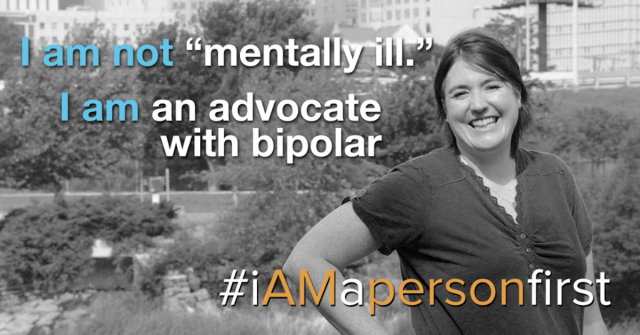Emily Richmond’s story is brief, but well worth the read. The brevity of her tale contrasts with her long, arduous fight with bipolar disorder. Richmond is a participant in the Mental Health Association Oklahoma’s (MHAOK) #iAMapersonfirst campaign, a statewide effort to erode the stigma that surrounds mental illness. MHAOK is a Tulsa-based nonprofit devoted to improving mental wellness around the state.
“Right now, Oklahoma is 100 years behind what we know scientifically about identification and treatment of mental illness versus the attitudes that still prevail in the general public,” said Mike Brose, MHAOK’s CEO. “The #iAMaperson first campaign across the state is aimed at closing that gap by reducing the stigma of mental illness through social media, email marketing, billboards, media stories and through word of mouth.”
An estimated 600,000 Oklahomans suffer from mental illness, according to Mental Health America.
Richmond was initially reluctant to participate. She was unemployed when the campaign started and worried about the stigma she might run into with potential employers.
“When I first did the campaign I was thinking to myself, ‘I don’t know that I really want to put myself out there as having bipolar disorder in case people who are considering hiring me will see it,’” Richmond said. “As far as getting a job anywhere else, I’m not sure that I would have done the campaign because it would have been putting my information out there.”
She now works as a recovery-support specialist with MHAOK. The job requirements include firsthand experience with mental illness.
“Being able to walk around and proudly say that I’m in recovery from bipolar disorder is not acceptable yet in today’s world. My mental health struggles had to be kept deep within my soul,” Richmond wrote in her blog post for MHAOK. “The stigma society places on the mentally ill forces us to hide a huge part of who we are and quietly celebrate our own victories over our illnesses. We aren’t allowed to be proud about who we are and what we overcome daily because of how the rest of the world will decide to view us.”
National Suicide Prevention Hotline:
1-800-273-8255
Roughly 5.7 million American adults — 2.6 percent of the population — grapple with bipolar disorder in any given year. One in five Americans with bipolar disorder completes suicide. But with treatment, nine out of 10 live in recovery, according to the Depression and Bipolar Support Alliance (DBSA).
“To put Emily’s story into perspective, if someone is in a car accident and they break their leg, everyone will run up to them and want to know how it happened and how they can help,” Brose said. “But if your daughter has mental illness, no one talks about it and the fear of being ‘found out’ may keep the daughter from seeking treatment because she is afraid of what others may negatively think about her.”
Potential stigma ‘worth the risk’
Mary Call still wrestles with the general anxiety disorder (GAD), depression and ADHD that struck when she was 10.
Call works in the mental health field as a Christian counselor. Even working in an environment where professionals have an enlightened understanding of mental illness, she feared that participation in the campaign would bring reprisals from coworkers and potential employers.
“I think probably most people that know me know that I’ve struggled with all of this,” Call said. “There’s risk that a potential employer might see it and think, ‘I better not hire her’.”
Despite the risk, Call has no regrets.
“It’s worth the risk if people hear my story and decide to get some help. I didn’t get help. I wish I’d gotten help sooner in my life, but I didn’t because of some stigma and false teaching in my church. I didn’t get help real early in life and I wish I had,” she said.
According to the Anxiety and Depression Association of America, anxiety disorders hit 40 million Americans in any given year. The disorders are extremely susceptible to treatment, but only one third of victims seek treatment. Often, it’s the stigma of mental illness that stops them from taking the first steps to recovery, said Call.
The National Institute of Mental Health calls depression “common.” DBSA estimates that 6.7 percent of the American population — about 14.8 million adults — suffer with depression at any given time. Eighty percent of those that seek treatment live in recovery.
Recent ad campaign garners results
The campaign, which began on May 1, consists of billboards, social media, blogs and numerous events. While turnout at the events has been impressive according to Matt Gleason, MHAOK’s content coordinator, he said success is measured one person at a time.
Richmond agrees, pointing to her own participation in the campaign.
“It feels really good. I feel like a lot of people with mental illness don’t have a voice and aren’t willing to speak out about what they have to go through on a daily basis,” she said. “For me, it feels really empowering and really good to be able to reveal a part of myself that I feel like I have to keep under my hat all the time.”
Gleason did reference a recent ad campaign on Oklahoma City’s KFOR. The two-hour effort brought in more than 100 calls. Most of the callers, he said, were older parents with adult children suffering from mental illness. He hopes to see the same success with an upcoming television campaign in Tulsa.
“What we need to remember, and what this campaign is all about, is that there is no such thing as ‘the mentally ill,’ just as there is no such thing as ‘the heart diseased’,” Brose said. “They are Oklahomans who are impacted by mental illness. They have lives, they have families, jobs, they go to school. They are people first, and their illness is something they are working to overcome, just like any other illness.”



















